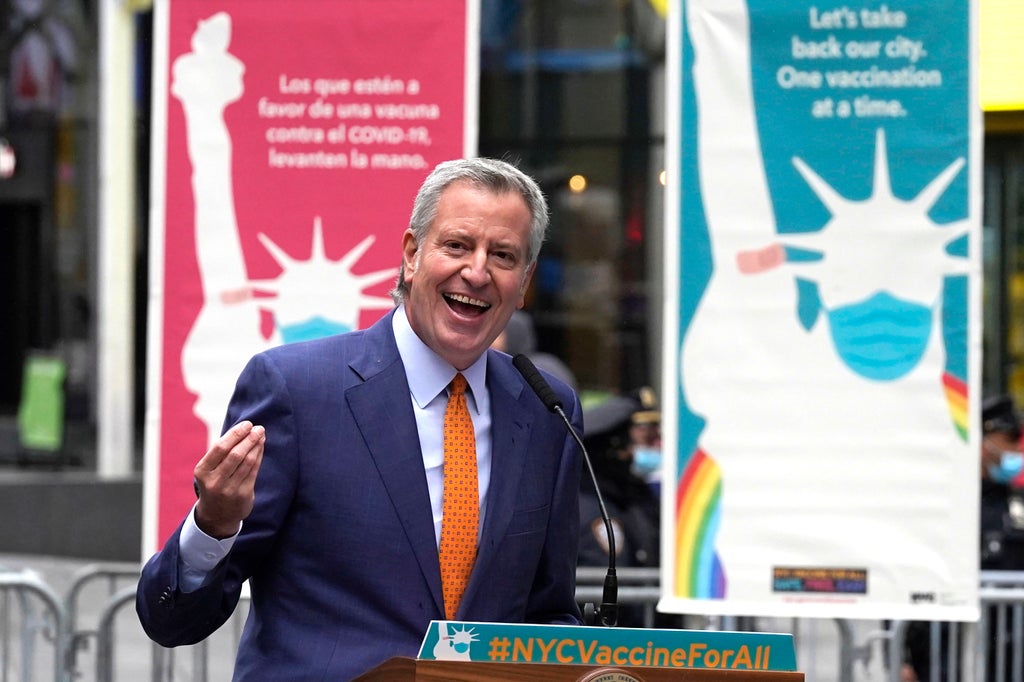
Former New York City Mayor Bill de Blasio announced Tuesday he will not run for governor, but will instead devote himself to fighting inequality in New York.
His decision to not enter the Democratic primary further strengthens the campaign of Gov. Kathy Hochul who already has a commanding start locking up endorsements and fundraising.
De Blasio, who left office at the end of 2021, had been hinting for months about a 2022 run for governor, saying he would like to stay in public service and is proud of his eight years as mayor of the largest city in the country.
De Blasio, 60, frequently clashed with former New York Gov. Andrew Cuomo who resigned from office in 2021 amid allegations he sexually harassed numerous women.
Hochul, who was Cuomo’s lieutenant governor and became the first woman to serve as New York's governor when she took over for Cuomo in August, faces two main challengers in the Democratic primary. Jumaane Williams who serves as a citizen ombudsman in his elected office of New York City Public Advocate, is also in the primary race, as is U.S. Rep. Tom Suozzi, a Democrat who represents Long Island and has touted his work to get Congress to raise a tax deduction cap that benefits a high-tax state like New York.
State Attorney General Letitia James, who investigated the allegations against Cuomo, dropped out after a short-lived bid and opted to instead run for reelection.
De Blasio — and Williams — would have counted on a base of voter support in Brooklyn, but Hochul has been making frequent trips to New York City and hobnobbing with Brooklyn Democrats, in particular, to shore up support. The Buffalo native had won endorsements from key figures in de Blasio's turf, like the chair of the Brooklyn Democratic Party and the Manhattan borough president.
De Blasio's campaign had been all but expected. He filed paperwork in early November with the state Board of Elections to create a fundraising committee — New Yorkers for a Fair Future — to allow him to raise money for a statewide campaign. In November, he unveiled a campaign-style statewide education plan calling for universal pre-K and “3-K,” and stayed coy in a series of interviews as to whether he intended to run.
In 2013, de Blasio became the first Democrat to serve as New York City mayor since 1993 in a city where Democrats outnumber Republicans 7 to 1. He came into office with a liberal agenda but struggled with unsparing and mocking tabloid headlines during his time running the nation’s largest city.
De Blasio, who was born in Manhattan and raised in Cambridge, Massachusetts, launched a short-lived presidential campaign in 2019, when he kicked off his first day as a candidate by trading insults with Trump. But he faced pushback from skeptical New Yorkers over his bid, punctuated by him failing to qualify for several debates, flubbing a campaign appearance in Miami by quoting Che Guevara and a technical glitch that distorted his voice when speaking to union workers in Iowa via videoconference.
Before serving as mayor, de Blasio was both a public advocate and a city council member. He worked on the 1989 mayoral campaign for David Dinkins, New York City's first Black mayor, and later served in Dinkins' administration. He also managed Hillary Clinton’s 2000 Senate campaign in New York, worked in former President Bill Clinton's administration in the Department of Housing and Urban Development and managed New York operations for the then-president's 1996 reelection campaign.







